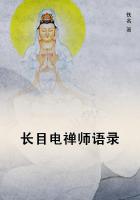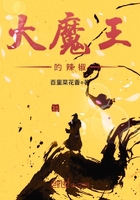THE horsemen dismounted, and, together with the men on foot, without a moment's delay taking up Sancho and Don Quixote bodily, they carried them into the court, all round which near a hundred torches fixed in sockets were burning, besides above five hundred lamps in the corridors, so that in spite of the night, which was somewhat dark, the want of daylight could not be perceived. In the middle of the court was a catafalque, raised about two yards above the ground and covered completely by an immense canopy of black velvet, and on the steps all round it white wax tapers burned in more than a hundred silver candlesticks. Upon the catafalque was seen the dead body of a damsel so lovely that by her beauty she made death itself look beautiful. She lay with her head resting upon a cushion of brocade and crowned with a garland of sweet-smelling flowers of divers sorts, her hands crossed upon her bosom, and between them a branch of yellow palm of victory. On one side of the court was erected a stage, where upon two chairs were seated two persons who from having crowns on their heads and sceptres in their hands appeared to be kings of some sort, whether real or mock ones. By the side of this stage, which was reached by steps, were two other chairs on which the men carrying the prisoners seated Don Quixote and Sancho, all in silence, and by signs giving them to understand that they too were to he silent; which, however, they would have been without any signs, for their amazement at all they saw held them tongue-tied.
And now two persons of distinction, who were at once recognised by Don Quixote as his hosts the duke and duchess, ascended the stage attended by a numerous suite, and seated themselves on two gorgeous chairs close to the two kings, as they seemed to be. Who would not have been amazed at this? Nor was this all, for Don Quixote had perceived that the dead body on the catafalque was that of the fair Altisidora. As the duke and duchess mounted the stage Don Quixote and Sancho rose and made them a profound obeisance, which they returned by bowing their heads slightly. At this moment an official crossed over, and approaching Sancho threw over him a robe of black buckram painted all over with flames of fire, and taking off his cap put upon his head a mitre such as those undergoing the sentence of the Holy Office wear; and whispered in his ear that he must not open his lips, or they would put a gag upon him, or take his life. Sancho surveyed himself from head to foot and saw himself all ablaze with flames; but as they did not burn him, he did not care two farthings for them. He took off the mitre and seeing painted with devils he put it on again, saying to himself, "Well, so far those don't burn me nor do these carry me off." Don Quixote surveyed him too, and though fear had got the better of his faculties, he could not help smiling to see the figure Sancho presented. And now from underneath the catafalque, so it seemed, there rose a low sweet sound of flutes, which, coming unbroken by human voice (for there silence itself kept silence), had a soft and languishing effect. Then, beside the pillow of what seemed to be the dead body, suddenly appeared a fair youth in a Roman habit, who, to the accompaniment of a harp which he himself played, sang in a sweet and clear voice these two stanzas:
While fair Altisidora, who the sport Of cold Don Quixote's cruelty hath been, Returns to life, and in this magic court The dames in sables come to grace the scene, And while her matrons all in seemly sort My lady robes in baize and bombazine, Her beauty and her sorrows will I sing With defter quill than touched the Thracian string.
But not in life alone, methinks, to me Belongs the office; Lady, when my tongue Is cold in death, believe me, unto thee My voice shall raise its tributary song.
My soul, from this strait prison-house set free, As o'er the Stygian lake it floats along, Thy praises singing still shall hold its way, And make the waters of oblivion stay.
At this point one of the two that looked like kings exclaimed, "Enough, enough, divine singer! It would be an endless task to put before us now the death and the charms of the peerless Altisidora, not dead as the ignorant world imagines, but living in the voice of fame and in the penance which Sancho Panza, here present, has to undergo to restore her to the long-lost light. Do thou, therefore, O Rhadamanthus, who sittest in judgment with me in the murky caverns of Dis, as thou knowest all that the inscrutable fates have decreed touching the resuscitation of this damsel, announce and declare it at once, that the happiness we look forward to from her restoration be no longer deferred."
No sooner had Minos the fellow judge of Rhadamanthus said this, than Rhadamanthus rising up said:
"Ho, officials of this house, high and low, great and small, make haste hither one and all, and print on Sancho's face four-and-twenty smacks, and give him twelve pinches and six pin thrusts in the back and arms; for upon this ceremony depends the restoration of Altisidora."
On hearing this Sancho broke silence and cried out, "By all that's good, I'll as soon let my face be smacked or handled as turn Moor.













